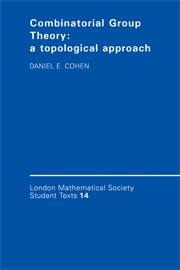Book contents
- Frontmatter
- INTRODUCTION
- Contents
- CHAPTER 1 COMBINATORIAL GROUP THEORY
- CHAPTER 2 SPACES AND THEIR PATHS
- CHAPTER 3 GROUPOIDS
- CHAPTER 4 THE FUNDAMENTAL GROUPOID AND THE FUNDAMENTAL GROUP
- CHAPTER 5 COMPLEXES
- CHAPTER 6 COVERINGS OF SPACES AND COMPLEXES
- CHAPTER 7 COVERINGS AND GROUP THEORY
- CHAPTER 8 BASS-SERRE THEORY
- CHAPTER 9 DECISION PROBLEMS
- CHAPTER 10 FURTHER TOPICS
- NOTES AND REFERENCES
- BIBLIOGRAPHY
- INDEX
- Frontmatter
- INTRODUCTION
- Contents
- CHAPTER 1 COMBINATORIAL GROUP THEORY
- CHAPTER 2 SPACES AND THEIR PATHS
- CHAPTER 3 GROUPOIDS
- CHAPTER 4 THE FUNDAMENTAL GROUPOID AND THE FUNDAMENTAL GROUP
- CHAPTER 5 COMPLEXES
- CHAPTER 6 COVERINGS OF SPACES AND COMPLEXES
- CHAPTER 7 COVERINGS AND GROUP THEORY
- CHAPTER 8 BASS-SERRE THEORY
- CHAPTER 9 DECISION PROBLEMS
- CHAPTER 10 FURTHER TOPICS
- NOTES AND REFERENCES
- BIBLIOGRAPHY
- INDEX
Summary
Combinatorial group theory can be regarded as that branch of group theory which considers groups given by generators and relations. Some of its basic results involve manipulation with words; that is, products of the generators and their inverses. It is this aspect to which the word “combinatorial” refers; it is not connected with that branch of mathematics known as combinatorics.
From its earliest stages this theory has been closely connected with topology. To any topological space there is an associated group, called the fundamental group of the space. In trying to investigate properties of certain spaces we are led to problems in combinatorial group theory. Conversely, some problems in combinatorial group theory are best solved by geometric and topological discussions of suitable fundamental groups.
It is this interplay between group theory and topology which is the theme of this book. The texts on combinatorial group theory by Magnus, Karrass, and Solitar (1966) and by Lyndon and Schupp (1977) go much deeper into the group theory, but have little to say about the topology, while the texts by Massey (1967) and Stilwell (1980) concentrate on the topology rather than the group theory.
Chapter 1 contains the main constructions of combinatorial group theory; free groups, presentations, free products, amalgamated free products, and the HNN extension. The various Normal Form Theorems are proved, with several different proofs, and applications of the constructions are made (for instance, to show the existence of a finitely generated infinite simple group). Chapter 2 has some topological preliminaries; ways of building new spaces from old ones, and a discussion of paths in spaces.
Information
- Type
- Chapter
- Information
- Combinatorial Group TheoryA Topological Approach, pp. v - viiiPublisher: Cambridge University PressPrint publication year: 1989
